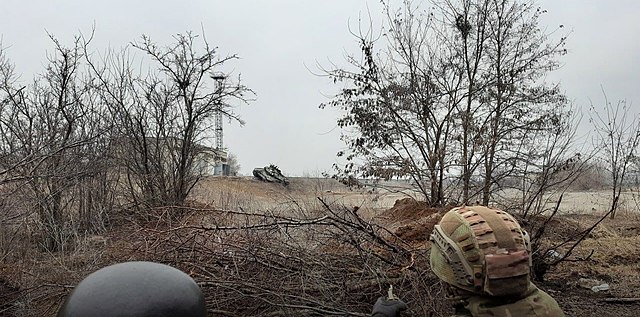Playing catch-up: the Kremlin’s rising tolerance for human loss

Ukrainian soldiers attack a Russian tank in Mariupol
Morgan Aikele- The war in Ukraine has trudged on for nearly a year, with no clear end in sight. The strength of both Russian and Ukrainian forces has risen and fallen throughout the year’s course, largely due to fluctuations in raw material power. With Ukraine poised to receive its newest aid in the form of western tanks, Russia is scrounging to catch up– and is using inexperienced, untrained soldiers to do so.
Material power refers to the “things” that a country has which make it powerful. While many national elements can fall into this definition, the most obvious are a sizable military force, robust economy and industry, and an educated population. In this context, Russia would typically be considered to be more materially powerful than Ukraine– it is much larger in population, military size, and economy. However, Ukraine has held much of its ground with surprising force over the course of the war. , This has been due to both the efforts of its own people and government along with aid from other countries. In light of key battleground setbacks during last fall, and Ukraine poised to receive newer weaponry, the Kremlin has sought to increase its own material power. In order to do so, President Vladimir Putin called in over 300,000 reservists last fall, and many soldiers have faced battle just days after their mobilization. Apparently, the draft was intended to pull in men with previous military skills in need of a refresher course, but has virtually pulled in any male. For now, the sheer volume of Russian troops has proved somewhat successful for gaining some ground. Ukrainian forces have reported that while the Russian troops are hardly trained in comparison with Ukraine’s own, the vast numbers of the Russian army still prove overwhelming. For Russia, a grab for material power has necessarily resulted in a higher tolerance for human casualties– their soldiers are fighting on foot, unsupported by much else.
Understanding ideological power can increase our understanding of how this major draft of soldiers may affect Russia in the long run. Ideological power refers to the influence that an actor (in this case, the Kremlin) has to get others to do what they want with unquestioning adherence. Russia’s tactic of employing vast numbers of untrained troops may appear to be a solution, but videos posted online of hungry, ill-prepared troops, combined with thousands of draftees threatening to strike in response, may indicate that the Russian government holds less ideological power over its own people than it may believe.
Photo licensing: This file comes from the website, social media or Youtube channel of Ministry of Internal Affairs of Ukraine and is licensed under the Creative Commons Attribution 4.0 International License.

